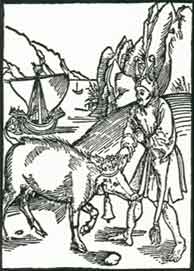Germany, (c. 1457-1521)

OF COARSE FOOLS
- Vile, scolding words do irritate,
- Good manners thereby will abate
- If sow-bell’s rung from morn to late.
- A new St. Ruffian now holds sway,
- Men celebrate him much today
- And honor him in every place
- With words and ways that spell disgrace,
- And make a jest of ribaldry,
- Though belted not with decency.
- Sir Decency is doubtless dead,
- Fool holds the sow’s ear, wags her head,
- And makes the sow-bell loudly ring
- So that the sow her ditty sing.
- The sow leads on and cannot fail,
- She holds the fools’ ship by her tail,
- That laden down no wreck it be,
- For that would bring great misery.
- The wine no fool today would heed
- That’s quite inferior wine, indeed.
- Full many a litter breeds the sow,
- And wisdom lives in exile now;
- The swine on decent people frown,
- The sow alone now wears the crown.
- Whoever rings her bell, that man
- Is now the one who leads the van,
- While he who does such foolish work
- As that famed priest of Kalenberg,
- Or as Monk Islan long of beard,
- He thinks that he’s himself endeared.
- Some men in folly are so free
- That if Orestes them could see —
- He had no brains beneath his hat —
- He’d say: “Sane men can’t act like that.”
- “Come clean to village” lost its sense,
- For peasants drink and give offense.
- Sir Alderblock is roundly fêted,
- With Roughenough and Seldom Sated.
- Most every fool doth love the sow
- And wants to have his grease box now,
- Which he keeps filled with donkey’s fat.
- But rarely is it bare of that,
- Though everyone would take a piece,
- To keep his bagpipes well in grease.
- Now grossness everywhere has come
- And seems to live in every home,
- And sense and prudence both are dead.
- What now is written, what is said,
- Is covered o’er with donkey’s fat.
- Carousers know and cherish that.
- The sow the matins does recite,
- The donkey sings the prime all right,
- St. Ruffian sings the tierce with might,
- Hatmakers’ boys recite the sext,
- Coarse felters do compose the text.
- Rude rabble doth recite the none,
- And gluttoners the words intone,
- The vespers from a sow’s voice ring,
- Filth, gross untidiness then sing.
- And lastly the compline is done,
- When all is full at length is sung.
- The donkey’s fat is potent grease,
- With sow’s fat it is mixed with ease.
- One reveler smears it on another,
- If he would have him be his brother.
- Reserve and modesty ’twill smother.
- Nor God nor honor then are spared,
- Lewd things are scrutinized and aired,
- The one who’s quite the foulest swine
- Is given a brimming glass of wine.
- Applause is his with vim and zest,
- He’s asked to tell another jest.
- They say: “A great success you’ve scored!
- You keep us thus from being bored!”
- As fool to fool they all declare:
- “Be sociable, gay, debonair!
- Feti gran scbier e belli sckier!
- Let’s all be cheerful while we’re here,
- Good fellows should rejoice, not pout,
- Let’s laugh and sing, carouse and shout!
- We’ve but a little while on earth,
- Let’s spend it wassailing, in mirth.
- The man who dies will never rise
- And never walk ‘neath sunny skies.
- Has any mortal ever learned
- Of mortal men from hell returned,
- That they might tell us how it’s been?
- To have a good time’s not a sin!
- The priests can say whate’er they may,
- Let them forbid this, that for aye!
- If this were sinful, as they claim,
- Then why, why do they do the same?
- If priests did not discuss the devil,
- And shepherds saw in wolves no evil,
- No one would profit very much.”
- ’tis fools alone who utter such
- Remarks, and with their brutal crew
- Insult the world and God and you,
- But finally their gain is rue.
Editor’s Note:
The Ship of Fools was a series of satires on contemporary vices depicted through the stories of more than 100 fools gathered on a shipbound for Narragonia, the fools’ paradise. It also contained beautifully executed woodcut illustrations — many ascribed to Albrecht Dürer.
The Ship of Fools became popular throughout Europe, going through numerous re-printings in Brant’s lifetime, as well as being translated into low-German, Latin, French, Dutch and English.
This work set the standard for the allegorical satires or ‘fool’s literature’ that were popular throughout Europe from the 15th to the 17th century.
About the Poet
Sebastian Brant (c. 1457-1521), German humanist and satirical poet, famed in his work both as a poet and as a legal authority. Though he studied and taught law at Basle University and was made an imperial councilor by Maximilian I, Brant is remembered now as a major influence on German literature. Brant’s writings are varied: legal, religious, political and especially moral. [DES-6/03]
